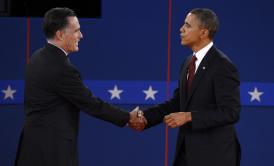Before the second presidential debate kicked off, the conventional wisdom among many political pundits was that the town hall format did not lend itself well to political attacks. Boy, were they proved wrong.
The second match-up between President Obama and Mitt Romney was red meat for political junkies and partisans alike as the two candidates almost seemed to play out an episode of Slate’s Political Kombat onstage. Undecided voters? Eh, they probably weren’t fans. They hate squabbles after all.
So who won in the eyes of the pundits? It was pretty even—both candidates had good moments and bad ones—but Obama seems to be getting the edge for two simple reasons: He bested his previous performance and appeared to come out on top on a heated exchange about Libya. Conservatives obviously disagree that Obama won, but—tellingly—there is lots of frustration that Romney was not able to turn the Libya question into a touchdown. Let’s get to the pundits.
The National Journal’s Ron Fournier does a good job of capturing the eternal contradiction of turning to news junkies for debate assessment. “Obama and Romney scored points while turning off independent voters with their point-scoring,” he writes. “Democratic and Republican partisans will find reason to celebrate the debate but it likely did nothing to reshape the closely fought race.” The whole thing was “fantastic theater,” agrees the Los Angeles Times’ Jon Healey, “but not decisive politics.”
Obama came out swinging right from the beginning. Maybe too hard. The Washington Post’s Chris Cillizza writes that “Obama seemed to be on the wrong side of the angry/passionate divide in the first 15 minutes” but then managed to moderate his tone “to the sober/serious yet forceful persona that he needed.” Obama seemed to be a different person from Denver while Romney somehow “failed to match the dominance of his first debate, seeming peevish at Obama’s interruptions and appealing to debate moderator Candy Crowley for equal time,” writes Time’s Alex Altman.
Sure it may not have really helped sway any undecided voters, but maybe that’s not what was most important. Maybe what mattered most to Obama was getting Democrats excited about his candidacy again after his lackluster performance in the first debate. If so, he seems to have done it. Andrew Sullivan for one seems to have calmed down after his now-famous panic attack that followed the first debate. On Tuesday night, Sullivan confidently wrote that “Obama dominated Romney tonight in every single way,” adding that the president “gave us all more than ample reason to carry on the fight.” Probably nothing got his base more excited than the very end when Obama managed to unholster a mention of Romney’s 47 percent remark, writes the Washington Post’s Jonathan Capehart.
Even if he didn’t fully sway undecideds, Obama managed to take “steps towards undoing the damaging dynamic Romney cemented during the last debate” in which the Republican had managed to portray himself as the agent of change, writes the Washington Post’s Greg Sargent.
That doesn’t mean conservatives see it the same way, of course. Power Line’s John Hinderaker writes that while Obama did better than in the previous debate, it wasn’t the type of performance that could reverse his decline in the polls. “The key factor in my view is that whenever the candidates talked about Obama’s record, Romney clobbered the president,” he writes. Yet even Hinderaker expresses annoyance that Romney “muffed it to some degree” when he was asked about Libya, which should have been an easy victory.
BuzzFeed, and others, were quick to identify the Libya exchange as the moment in which Obama officially won the debate simply because Romney tried to go too far with his criticism. The National Journal’s Jim Geraghty argues the question “may not be as damaging for Romney as the Obama team may hope” because it came late in the debate, but “considering how many conservatives thought Libya could be a huge issue in these campaign’s final weeks, Romney’s handling is deeply disappointing.”
Looking forward, conservatives are a bit worried. Even as they express confidence that Obama likely didn’t reverse Romney’s momentum, the virtual draw means a lot will be riding on Monday night’s foreign policy debate, which, as the Weekly Standard’s William Kristol notes, “isn’t Romney’s natural subject.” For his part, the National Journal’s Yuval Levin writes that the one factor Republicans should worry about is that “Romney was neither effective nor sure-footed on foreign policy in this debate.” Could they already be trying to play the expectations game?
For now, Time’s Mark Halperin gives Obama a B- and Romney a C.
